-
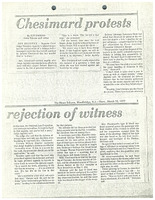 Chesimard Protests Rejection of Witness, Newspaper Article.
Chesimard Protests Rejection of Witness, Newspaper Article. A newspaper article from The News Tribune about the defense team for Assata Shakur (JoAnne Chesimard), on trial for the 1973 killing of a state trooper, being denied calling an extra ballistics witness by the judge. The prosecution contended the witness was not valid since the defense team missed the cutoff date to add witnesses to their list.
-
 A poem titled "To Harold Russell" by Denise Oliver.
A poem titled "To Harold Russell" by Denise Oliver. A poem written by Denise Oliver to Harold Russell after his death from a shootout with the Harlem police in April, 1971. Harold Russell was a Black Liberation Army (BLA) member and one of many members who lost their lives in police killings.
-
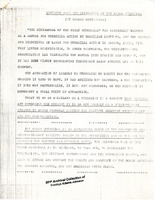 MiniManual of the Urban Guerilla, Excerpts.
MiniManual of the Urban Guerilla, Excerpts. Excerpts from Carlos Marighella's Minimanual of the Guerilla. It lays out tactics for struggle against an oppressive state. Marighella, a Brazilian Marxist–Leninist revolutionary, published the book in 1969 and it became popular in revolutionary circles, including within Black Nationalistic circles in the United States.
-
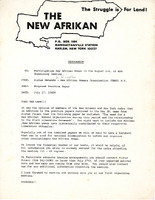 Memo to Participating New Afrikan Women in the August 1-3, 15 ADM Organizing Meeting from Sister Nehanda of New Afrikan Women’s Organization (NAWO) of New York.
Memo to Participating New Afrikan Women in the August 1-3, 15 ADM Organizing Meeting from Sister Nehanda of New Afrikan Women’s Organization (NAWO) of New York. A memo from Black revolutionary woman Nehanda Abiodun, who was exiled to Cuba in 1982, suggesting that a document be created that can be used for dissemination to inform and organize other revolutionary New Afrikan Women around the country. The heading reads: “The New Afrikan: The Struggle is for Land!” The memo is dated July 17, 15 ADM.
-
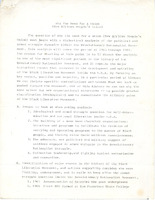 Why the Need for a Union (New Afrikan People’s Union), Outline.
Why the Need for a Union (New Afrikan People’s Union), Outline. A historical analysis outlining the need for a New Afrikan People's Union. The author writes that the need for the new union can be understood by doing a historical analysis on the years 1965-1980, the time when the Black liberation movement in the United States was spiraling, and that 1980 was a time of natural evolution within the movement.
-
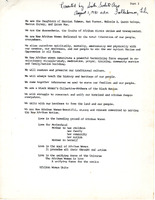 Untitled Speech about the role of Black women in the Republic of New Afrika.
Untitled Speech about the role of Black women in the Republic of New Afrika. A speech about the role of Black women in the Republic of New Afrika. She writes that New Afrikan women are dedicated to the total liberation of their people and will also teach the history and heritage of their children to prepare them for self rule. The Republic of New Afrika was founded in 1968 and popularized by black militant groups.
-
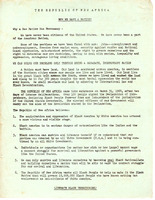 A Collection of Republic of New Africa Documents, Part 2.
A Collection of Republic of New Africa Documents, Part 2. A collection of The Republic of New Afrika documents: a memo titled “Now We Have a Nation!” explaining the necessity of a new nation for Black people in the United States; The New Afrikan Creed, a 15 point list of beliefs of the Republic of New Afrika; and a rewriting of the Declaration of Independence for the Republic of New Afrika.
-
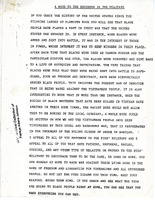 A Word to the Brothers in the Military, Essay.
A Word to the Brothers in the Military, Essay. An essay encouraging Black members of the military to turn their weapons on their racist officers and come home with as many weapons as possible, like machine guns and grenades, for the liberation struggle. The author also suggests that the Black military members destroy machinery such as planes, tanks, helicopters, and ammunition dumps.
-
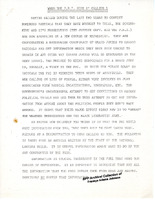 When the FBI Come A' Calling!, Memo.
When the FBI Come A' Calling!, Memo. A memo describing one's rights when confronted by the Federal Bureau of Investigation (FBI). The memo states that the FBI is coordinating grand juries to harass radicals. Agents are always asking questions intentionally to incriminate the subject and therefore no one should ever speak with them without an attorney present.
-
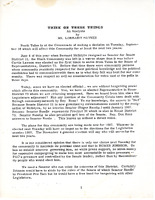 Think on These Things: An Analysis, Letter, September 13, 1986.
Think on These Things: An Analysis, Letter, September 13, 1986. An analysis by Lorraine Haynes of an upcoming election for representative of House District 73 in Oklahoma, which encompasses North Tulsa, an area where a large percentage of Tulsa’s African American population resides. Haynes supports Homer Johnson as the best candidate to represent the community as he has no ties to outside influences.
-
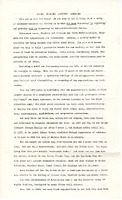 Unite! Educate! Agitate! Liberate!, Essay.
Unite! Educate! Agitate! Liberate!, Essay. A call for support, solidarity, and financial aid for the legal defense of people on trial for police killings. The author writes that the incarcerations are part of a long-term strategy of the system to destroy the Black and Puerto Rican freedom movements and gives multiple examples of people and organizations that had been carried out on.
-
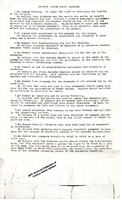 Student Union Front Platform
Student Union Front Platform A 10 point platform for the Student United Front. The platform, drawing inspiration from the Black Panther Party Ten Point-Point Program, is a list of demands by students for better services on campus as well as a call for expelling all white racist teachers, free education for all, and the exclusion of police from school premises.
-
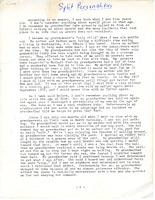 Split Personalities, Essay.
Split Personalities, Essay. An essay by an unknown woman writing about her different experiences in the South and New York and how those experiences have shaped her personality and worldview. She writes, “I guess I have two personalities. One is my real personality (my Southern upbringing) and the other is the personality the people of New York have forced upon me.”
-
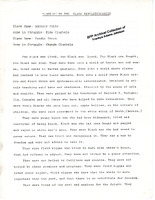 Requiem to Two Black Revolutionaries, a Requiem Written For Two Men Who Died in Prison.
Requiem to Two Black Revolutionaries, a Requiem Written For Two Men Who Died in Prison. A requiem written to Anthony White (Kimu Olugbala) and Woodie Green (Changa Olugbala), two members of the Black Liberation Army (BLA) who died in prison. The author writes that their memory will be used as fuel for the ongoing struggle against oppression. A quote from Argentine Marxist revolutionary Che Guevera is printed at the bottom of page 2.
-
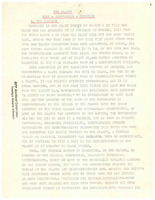 The Plague: Dope + Capitalism = Genocide, Essay.
The Plague: Dope + Capitalism = Genocide, Essay. A 1969 essay by Micahel “Cetewayo” Tabor about the problem of drugs, specifically heroin, and the effects on people of color. He notes that the Black Panther Party is currently working on plans to combat this “plague.” Tabor was part of a group of Panthers who fled to Algeria in 1971 after skipping a trial concerning a bombing plot.
-
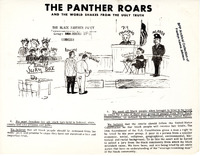 The Panther Roars and the World Shakes From the Ugly Truth, Political Cartoon.
The Panther Roars and the World Shakes From the Ugly Truth, Political Cartoon. A political cartoon of a courtroom scene with the caption “The Black Panther Party Always Remembers Its Enemies.” The jury, judge, secretary, and bailiff are all depicted as pigs, while the lawyer and defendant are depicted as people. Numbers 8 and 9 from the Black Panther Party Ten Point Program are printed at the bottom of the page.
-
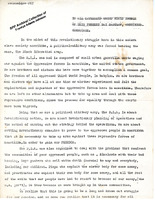 A Rough Draft of Greetings to be Given to People Attending a Black Liberation Army Rally, With Edits by an Unknown Person.
A Rough Draft of Greetings to be Given to People Attending a Black Liberation Army Rally, With Edits by an Unknown Person. A rough draft of greetings to be given to people attending a Black Liberation Army (BLA) rally, with edits by an unknown person.The greetings outline the history and tenets of the BLA. “Communique #17” and “To All Oppressed Third World People of This Present Day Babylon, Amerikka. Greetings” on the top of page 1 were both crossed out.
-
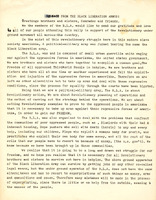 Message from the Black Liberation Army!!! Greetings Given to Brothers and Sisters, Comrades and Friends Attending a Rally.
Message from the Black Liberation Army!!! Greetings Given to Brothers and Sisters, Comrades and Friends Attending a Rally. A message from the Black Liberation Army (BLA) to brothers and sisters, comrades and friends attending a rally. The message briefly outlines the history and tenets of the organization, including taking up arms against the oppressive government as well as combatting ills in the community such as slumlords, drug pushers, and pimps.
-
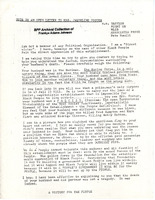 An Open Letter to Jacqueline Foster from a "Street Sister," Unknown Date.
An Open Letter to Jacqueline Foster from a "Street Sister," Unknown Date. A letter to Jacqueline Foster, whose husband was recently killed in the line of duty as a police officer. The author writes that the officer, even though he was Black, was fighting on the side of the “racist, capitolistic (sic) establishment” and therefore his death was not a tragedy but “it was indeed a victory for the people.”
-
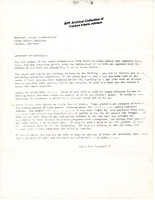 A Letter to Governor Nelson Rockerfeller, Unknown Date.
A Letter to Governor Nelson Rockerfeller, Unknown Date. A letter to New York Governor Nelson Rockefeller on behalf of Cornelius Butler and Lawrence Hayes, who were being tried for murder. The men were convicted to the death penalty on April 11, 1972 for their role in the hold-up of a convenience store and the murder of a police officer. Supporters contend that neither of the men fired the shots.
-
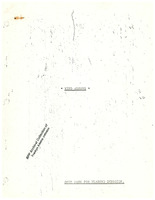 King Alfred: Code Name for Planned Genocide, Book Snippet.
King Alfred: Code Name for Planned Genocide, Book Snippet. A copy of “The King Alfred Plan,” a fictional CIA-led scheme supporting an international effort to eliminate people of African descent, invented by author John A. Williams in his 1967 novel The Man Who Cried I Am. Copies of the plan circulated in Black communities during the late 1960s and early 1970s, with many people accepting it at face value.
-
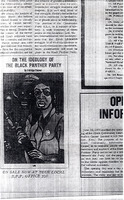 On the Ideology of the Black Panther Party, Newspaper Ad.
On the Ideology of the Black Panther Party, Newspaper Ad. The artwork and advertisement in the newspaper The Black Panther for a series of articles titled “On the Ideology of the Black Panther Party” by Eldridge Cleaver. At the time, Cleaver was serving as Minister of Information for the Black Panther Party in Oakland, California.
-
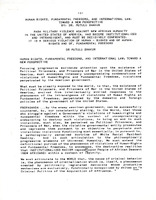 A paper titled Human Rights, Fundamental Freedoms, and International Law: Toward A New Perspective.
A paper titled Human Rights, Fundamental Freedoms, and International Law: Toward A New Perspective. A paper by Dr. Mutulu Shakur that argues the existence of political prisoners reveals the violations of human rights perpetuated by the United States government against Black people. Dr. Shakur wrote this from prison, where he was serving a 60 year sentence for his role in a Black Liberation Army (BLA) led robbery in 1981.
-
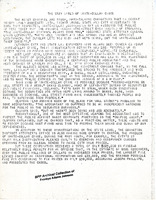 The Gray World of White Collar Crime, Memo.
The Gray World of White Collar Crime, Memo. A memo about the real effects of white-collar crime and some ideas about solutions to combat it. The author of the memo gives examples of recent corporate and Wall Street offenses and penalties levied, but argues that not enough is being done. The author states that white-collar crime is perhaps even worse for communities than armed robberies.
-
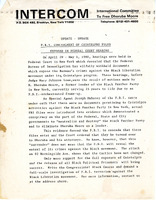 FBI Concealment of Cointelpro Files Exposed in Federal Court Hearing, Memo.
FBI Concealment of Cointelpro Files Exposed in Federal Court Hearing, Memo. A memo from the International Committee to Free Dhoruba Moore (Dhoruba Bin Wahad a/k/a Richard Moore) asking for members to write to the Congressional Black Caucus to demand a full-scale investigation after evidence of the FBI's Cointelpro program was exposed in court during hearings that were the result of motions filed by Moore.
 Chesimard Protests Rejection of Witness, Newspaper Article. A newspaper article from The News Tribune about the defense team for Assata Shakur (JoAnne Chesimard), on trial for the 1973 killing of a state trooper, being denied calling an extra ballistics witness by the judge. The prosecution contended the witness was not valid since the defense team missed the cutoff date to add witnesses to their list.
Chesimard Protests Rejection of Witness, Newspaper Article. A newspaper article from The News Tribune about the defense team for Assata Shakur (JoAnne Chesimard), on trial for the 1973 killing of a state trooper, being denied calling an extra ballistics witness by the judge. The prosecution contended the witness was not valid since the defense team missed the cutoff date to add witnesses to their list. A poem titled "To Harold Russell" by Denise Oliver. A poem written by Denise Oliver to Harold Russell after his death from a shootout with the Harlem police in April, 1971. Harold Russell was a Black Liberation Army (BLA) member and one of many members who lost their lives in police killings.
A poem titled "To Harold Russell" by Denise Oliver. A poem written by Denise Oliver to Harold Russell after his death from a shootout with the Harlem police in April, 1971. Harold Russell was a Black Liberation Army (BLA) member and one of many members who lost their lives in police killings. MiniManual of the Urban Guerilla, Excerpts. Excerpts from Carlos Marighella's Minimanual of the Guerilla. It lays out tactics for struggle against an oppressive state. Marighella, a Brazilian Marxist–Leninist revolutionary, published the book in 1969 and it became popular in revolutionary circles, including within Black Nationalistic circles in the United States.
MiniManual of the Urban Guerilla, Excerpts. Excerpts from Carlos Marighella's Minimanual of the Guerilla. It lays out tactics for struggle against an oppressive state. Marighella, a Brazilian Marxist–Leninist revolutionary, published the book in 1969 and it became popular in revolutionary circles, including within Black Nationalistic circles in the United States. Memo to Participating New Afrikan Women in the August 1-3, 15 ADM Organizing Meeting from Sister Nehanda of New Afrikan Women’s Organization (NAWO) of New York. A memo from Black revolutionary woman Nehanda Abiodun, who was exiled to Cuba in 1982, suggesting that a document be created that can be used for dissemination to inform and organize other revolutionary New Afrikan Women around the country. The heading reads: “The New Afrikan: The Struggle is for Land!” The memo is dated July 17, 15 ADM.
Memo to Participating New Afrikan Women in the August 1-3, 15 ADM Organizing Meeting from Sister Nehanda of New Afrikan Women’s Organization (NAWO) of New York. A memo from Black revolutionary woman Nehanda Abiodun, who was exiled to Cuba in 1982, suggesting that a document be created that can be used for dissemination to inform and organize other revolutionary New Afrikan Women around the country. The heading reads: “The New Afrikan: The Struggle is for Land!” The memo is dated July 17, 15 ADM. Why the Need for a Union (New Afrikan People’s Union), Outline. A historical analysis outlining the need for a New Afrikan People's Union. The author writes that the need for the new union can be understood by doing a historical analysis on the years 1965-1980, the time when the Black liberation movement in the United States was spiraling, and that 1980 was a time of natural evolution within the movement.
Why the Need for a Union (New Afrikan People’s Union), Outline. A historical analysis outlining the need for a New Afrikan People's Union. The author writes that the need for the new union can be understood by doing a historical analysis on the years 1965-1980, the time when the Black liberation movement in the United States was spiraling, and that 1980 was a time of natural evolution within the movement. Untitled Speech about the role of Black women in the Republic of New Afrika. A speech about the role of Black women in the Republic of New Afrika. She writes that New Afrikan women are dedicated to the total liberation of their people and will also teach the history and heritage of their children to prepare them for self rule. The Republic of New Afrika was founded in 1968 and popularized by black militant groups.
Untitled Speech about the role of Black women in the Republic of New Afrika. A speech about the role of Black women in the Republic of New Afrika. She writes that New Afrikan women are dedicated to the total liberation of their people and will also teach the history and heritage of their children to prepare them for self rule. The Republic of New Afrika was founded in 1968 and popularized by black militant groups. A Collection of Republic of New Africa Documents, Part 2. A collection of The Republic of New Afrika documents: a memo titled “Now We Have a Nation!” explaining the necessity of a new nation for Black people in the United States; The New Afrikan Creed, a 15 point list of beliefs of the Republic of New Afrika; and a rewriting of the Declaration of Independence for the Republic of New Afrika.
A Collection of Republic of New Africa Documents, Part 2. A collection of The Republic of New Afrika documents: a memo titled “Now We Have a Nation!” explaining the necessity of a new nation for Black people in the United States; The New Afrikan Creed, a 15 point list of beliefs of the Republic of New Afrika; and a rewriting of the Declaration of Independence for the Republic of New Afrika. A Word to the Brothers in the Military, Essay. An essay encouraging Black members of the military to turn their weapons on their racist officers and come home with as many weapons as possible, like machine guns and grenades, for the liberation struggle. The author also suggests that the Black military members destroy machinery such as planes, tanks, helicopters, and ammunition dumps.
A Word to the Brothers in the Military, Essay. An essay encouraging Black members of the military to turn their weapons on their racist officers and come home with as many weapons as possible, like machine guns and grenades, for the liberation struggle. The author also suggests that the Black military members destroy machinery such as planes, tanks, helicopters, and ammunition dumps. When the FBI Come A' Calling!, Memo. A memo describing one's rights when confronted by the Federal Bureau of Investigation (FBI). The memo states that the FBI is coordinating grand juries to harass radicals. Agents are always asking questions intentionally to incriminate the subject and therefore no one should ever speak with them without an attorney present.
When the FBI Come A' Calling!, Memo. A memo describing one's rights when confronted by the Federal Bureau of Investigation (FBI). The memo states that the FBI is coordinating grand juries to harass radicals. Agents are always asking questions intentionally to incriminate the subject and therefore no one should ever speak with them without an attorney present. Think on These Things: An Analysis, Letter, September 13, 1986. An analysis by Lorraine Haynes of an upcoming election for representative of House District 73 in Oklahoma, which encompasses North Tulsa, an area where a large percentage of Tulsa’s African American population resides. Haynes supports Homer Johnson as the best candidate to represent the community as he has no ties to outside influences.
Think on These Things: An Analysis, Letter, September 13, 1986. An analysis by Lorraine Haynes of an upcoming election for representative of House District 73 in Oklahoma, which encompasses North Tulsa, an area where a large percentage of Tulsa’s African American population resides. Haynes supports Homer Johnson as the best candidate to represent the community as he has no ties to outside influences. Unite! Educate! Agitate! Liberate!, Essay. A call for support, solidarity, and financial aid for the legal defense of people on trial for police killings. The author writes that the incarcerations are part of a long-term strategy of the system to destroy the Black and Puerto Rican freedom movements and gives multiple examples of people and organizations that had been carried out on.
Unite! Educate! Agitate! Liberate!, Essay. A call for support, solidarity, and financial aid for the legal defense of people on trial for police killings. The author writes that the incarcerations are part of a long-term strategy of the system to destroy the Black and Puerto Rican freedom movements and gives multiple examples of people and organizations that had been carried out on. Student Union Front Platform A 10 point platform for the Student United Front. The platform, drawing inspiration from the Black Panther Party Ten Point-Point Program, is a list of demands by students for better services on campus as well as a call for expelling all white racist teachers, free education for all, and the exclusion of police from school premises.
Student Union Front Platform A 10 point platform for the Student United Front. The platform, drawing inspiration from the Black Panther Party Ten Point-Point Program, is a list of demands by students for better services on campus as well as a call for expelling all white racist teachers, free education for all, and the exclusion of police from school premises. Split Personalities, Essay. An essay by an unknown woman writing about her different experiences in the South and New York and how those experiences have shaped her personality and worldview. She writes, “I guess I have two personalities. One is my real personality (my Southern upbringing) and the other is the personality the people of New York have forced upon me.”
Split Personalities, Essay. An essay by an unknown woman writing about her different experiences in the South and New York and how those experiences have shaped her personality and worldview. She writes, “I guess I have two personalities. One is my real personality (my Southern upbringing) and the other is the personality the people of New York have forced upon me.” Requiem to Two Black Revolutionaries, a Requiem Written For Two Men Who Died in Prison. A requiem written to Anthony White (Kimu Olugbala) and Woodie Green (Changa Olugbala), two members of the Black Liberation Army (BLA) who died in prison. The author writes that their memory will be used as fuel for the ongoing struggle against oppression. A quote from Argentine Marxist revolutionary Che Guevera is printed at the bottom of page 2.
Requiem to Two Black Revolutionaries, a Requiem Written For Two Men Who Died in Prison. A requiem written to Anthony White (Kimu Olugbala) and Woodie Green (Changa Olugbala), two members of the Black Liberation Army (BLA) who died in prison. The author writes that their memory will be used as fuel for the ongoing struggle against oppression. A quote from Argentine Marxist revolutionary Che Guevera is printed at the bottom of page 2. The Plague: Dope + Capitalism = Genocide, Essay. A 1969 essay by Micahel “Cetewayo” Tabor about the problem of drugs, specifically heroin, and the effects on people of color. He notes that the Black Panther Party is currently working on plans to combat this “plague.” Tabor was part of a group of Panthers who fled to Algeria in 1971 after skipping a trial concerning a bombing plot.
The Plague: Dope + Capitalism = Genocide, Essay. A 1969 essay by Micahel “Cetewayo” Tabor about the problem of drugs, specifically heroin, and the effects on people of color. He notes that the Black Panther Party is currently working on plans to combat this “plague.” Tabor was part of a group of Panthers who fled to Algeria in 1971 after skipping a trial concerning a bombing plot. The Panther Roars and the World Shakes From the Ugly Truth, Political Cartoon. A political cartoon of a courtroom scene with the caption “The Black Panther Party Always Remembers Its Enemies.” The jury, judge, secretary, and bailiff are all depicted as pigs, while the lawyer and defendant are depicted as people. Numbers 8 and 9 from the Black Panther Party Ten Point Program are printed at the bottom of the page.
The Panther Roars and the World Shakes From the Ugly Truth, Political Cartoon. A political cartoon of a courtroom scene with the caption “The Black Panther Party Always Remembers Its Enemies.” The jury, judge, secretary, and bailiff are all depicted as pigs, while the lawyer and defendant are depicted as people. Numbers 8 and 9 from the Black Panther Party Ten Point Program are printed at the bottom of the page. A Rough Draft of Greetings to be Given to People Attending a Black Liberation Army Rally, With Edits by an Unknown Person. A rough draft of greetings to be given to people attending a Black Liberation Army (BLA) rally, with edits by an unknown person.The greetings outline the history and tenets of the BLA. “Communique #17” and “To All Oppressed Third World People of This Present Day Babylon, Amerikka. Greetings” on the top of page 1 were both crossed out.
A Rough Draft of Greetings to be Given to People Attending a Black Liberation Army Rally, With Edits by an Unknown Person. A rough draft of greetings to be given to people attending a Black Liberation Army (BLA) rally, with edits by an unknown person.The greetings outline the history and tenets of the BLA. “Communique #17” and “To All Oppressed Third World People of This Present Day Babylon, Amerikka. Greetings” on the top of page 1 were both crossed out. Message from the Black Liberation Army!!! Greetings Given to Brothers and Sisters, Comrades and Friends Attending a Rally. A message from the Black Liberation Army (BLA) to brothers and sisters, comrades and friends attending a rally. The message briefly outlines the history and tenets of the organization, including taking up arms against the oppressive government as well as combatting ills in the community such as slumlords, drug pushers, and pimps.
Message from the Black Liberation Army!!! Greetings Given to Brothers and Sisters, Comrades and Friends Attending a Rally. A message from the Black Liberation Army (BLA) to brothers and sisters, comrades and friends attending a rally. The message briefly outlines the history and tenets of the organization, including taking up arms against the oppressive government as well as combatting ills in the community such as slumlords, drug pushers, and pimps. An Open Letter to Jacqueline Foster from a "Street Sister," Unknown Date. A letter to Jacqueline Foster, whose husband was recently killed in the line of duty as a police officer. The author writes that the officer, even though he was Black, was fighting on the side of the “racist, capitolistic (sic) establishment” and therefore his death was not a tragedy but “it was indeed a victory for the people.”
An Open Letter to Jacqueline Foster from a "Street Sister," Unknown Date. A letter to Jacqueline Foster, whose husband was recently killed in the line of duty as a police officer. The author writes that the officer, even though he was Black, was fighting on the side of the “racist, capitolistic (sic) establishment” and therefore his death was not a tragedy but “it was indeed a victory for the people.” A Letter to Governor Nelson Rockerfeller, Unknown Date. A letter to New York Governor Nelson Rockefeller on behalf of Cornelius Butler and Lawrence Hayes, who were being tried for murder. The men were convicted to the death penalty on April 11, 1972 for their role in the hold-up of a convenience store and the murder of a police officer. Supporters contend that neither of the men fired the shots.
A Letter to Governor Nelson Rockerfeller, Unknown Date. A letter to New York Governor Nelson Rockefeller on behalf of Cornelius Butler and Lawrence Hayes, who were being tried for murder. The men were convicted to the death penalty on April 11, 1972 for their role in the hold-up of a convenience store and the murder of a police officer. Supporters contend that neither of the men fired the shots. King Alfred: Code Name for Planned Genocide, Book Snippet. A copy of “The King Alfred Plan,” a fictional CIA-led scheme supporting an international effort to eliminate people of African descent, invented by author John A. Williams in his 1967 novel The Man Who Cried I Am. Copies of the plan circulated in Black communities during the late 1960s and early 1970s, with many people accepting it at face value.
King Alfred: Code Name for Planned Genocide, Book Snippet. A copy of “The King Alfred Plan,” a fictional CIA-led scheme supporting an international effort to eliminate people of African descent, invented by author John A. Williams in his 1967 novel The Man Who Cried I Am. Copies of the plan circulated in Black communities during the late 1960s and early 1970s, with many people accepting it at face value. On the Ideology of the Black Panther Party, Newspaper Ad. The artwork and advertisement in the newspaper The Black Panther for a series of articles titled “On the Ideology of the Black Panther Party” by Eldridge Cleaver. At the time, Cleaver was serving as Minister of Information for the Black Panther Party in Oakland, California.
On the Ideology of the Black Panther Party, Newspaper Ad. The artwork and advertisement in the newspaper The Black Panther for a series of articles titled “On the Ideology of the Black Panther Party” by Eldridge Cleaver. At the time, Cleaver was serving as Minister of Information for the Black Panther Party in Oakland, California. A paper titled Human Rights, Fundamental Freedoms, and International Law: Toward A New Perspective. A paper by Dr. Mutulu Shakur that argues the existence of political prisoners reveals the violations of human rights perpetuated by the United States government against Black people. Dr. Shakur wrote this from prison, where he was serving a 60 year sentence for his role in a Black Liberation Army (BLA) led robbery in 1981.
A paper titled Human Rights, Fundamental Freedoms, and International Law: Toward A New Perspective. A paper by Dr. Mutulu Shakur that argues the existence of political prisoners reveals the violations of human rights perpetuated by the United States government against Black people. Dr. Shakur wrote this from prison, where he was serving a 60 year sentence for his role in a Black Liberation Army (BLA) led robbery in 1981. The Gray World of White Collar Crime, Memo. A memo about the real effects of white-collar crime and some ideas about solutions to combat it. The author of the memo gives examples of recent corporate and Wall Street offenses and penalties levied, but argues that not enough is being done. The author states that white-collar crime is perhaps even worse for communities than armed robberies.
The Gray World of White Collar Crime, Memo. A memo about the real effects of white-collar crime and some ideas about solutions to combat it. The author of the memo gives examples of recent corporate and Wall Street offenses and penalties levied, but argues that not enough is being done. The author states that white-collar crime is perhaps even worse for communities than armed robberies. FBI Concealment of Cointelpro Files Exposed in Federal Court Hearing, Memo. A memo from the International Committee to Free Dhoruba Moore (Dhoruba Bin Wahad a/k/a Richard Moore) asking for members to write to the Congressional Black Caucus to demand a full-scale investigation after evidence of the FBI's Cointelpro program was exposed in court during hearings that were the result of motions filed by Moore.
FBI Concealment of Cointelpro Files Exposed in Federal Court Hearing, Memo. A memo from the International Committee to Free Dhoruba Moore (Dhoruba Bin Wahad a/k/a Richard Moore) asking for members to write to the Congressional Black Caucus to demand a full-scale investigation after evidence of the FBI's Cointelpro program was exposed in court during hearings that were the result of motions filed by Moore.